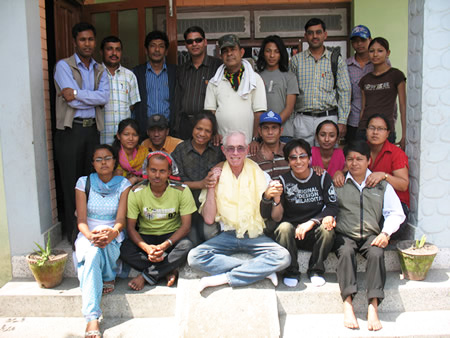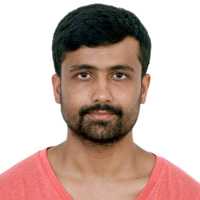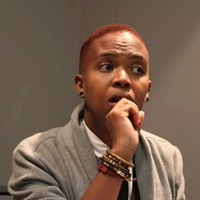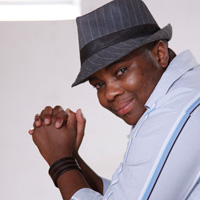Posted By Lucile Scott, June 9, 2014

A community gathering for Blue Diamond Society members
Seven advocates from three GMT Initiative grantee partners based in Thailand and South Africa are traveling to Nepal next week for an amfAR-sponsored advocacy exchange with The Blue Diamond Society (BDS), Nepal’s largest LGBT organization, and the Federation of Sexual and Gender Minorities, Nepal (FSGMN). BDS and FSGMN spearheaded the advocacy efforts that resulted in a 2007 Supreme Court decision declaring self-determination, not a medical diagnosis or other criteria, as the sole determinant for a person’s legal gender identity. As part of implementing that decision, last year Nepal became one of the few countries in the world to officially offer a third gender option on its citizenship documents.
The advocacy exchange is part of the GMT Initiative’s Advocacy in Action program, which, with support from the Arcus Foundation, provides funding, technical support, and advocacy training to four trans-focused community organizations to help them build their capacity to improve health and human rights policies for trans individuals in their countries. The visiting activists from the Health and Opportunity Network (HON), the Thai Transgender Alliance (ThaiTGA), and Transgender and Intersex Africa (TIA) will receive media and advocacy training from Nepali advocates and meet with members of the Nepali government to better understand all the steps and elements necessary to implement policies that recognize gender minorities. Below, three of the participating activists discuss trans rights in their countries and why they want to take part in the upcoming advocacy exchange.
 Basu Guragain, 28, Project Director of the Kathmandu Office of the Federation of Sexual and Gender Minorities, Nepal (FSGMN)
Basu Guragain, 28, Project Director of the Kathmandu Office of the Federation of Sexual and Gender Minorities, Nepal (FSGMN)
“Nepal has made impressive gains in rights for trans individuals, and I am convinced that these advances must be shared with affected persons everywhere to advance the rights of LGBT. The groundbreaking progress in Nepal was largely due to the relentless advocacy of the Blue Diamond Society’s former director, Mr. Sunil Babu Pant, who enlisted the help and support of students, legislators, national and international organizations, LGBT communities and organizations, and concerned citizens who supported the change at great personal peril.
The third-gender identity rulings are a monumental step forward in laying the groundwork for change, but have yet to have a substantial effect on the daily lives of trans persons in Nepal, who still face widespread and blatant discrimination in health, education, legal, and social services. But my determination to make self-identification easier for every member of gender minorities has only increased. As a gay man, it is also about my future, because the issues are very much the same for trans and gay people in Nepal and we are very much together as an LGBT movement.”
 Kath Khangpiboon, 27, Co-founder and Working Group Member of the Thai Transgender Alliance (ThaiTGA)
Kath Khangpiboon, 27, Co-founder and Working Group Member of the Thai Transgender Alliance (ThaiTGA)
“Thai society expects all us trans people to be alike—funny, devoid of substance, obsessed with sex, an expert in sexual techniques, prone to lying, unable to have true love, perverted, and so on. If a trans person chooses to live her life in a way that differs from these societal prejudices, she will be heavily marginalized, or one might say, left at the edge of the margin and about to fall off the page—denied employment, impoverished, confused, devoid of rights, and without a way out.
ThaiTGA is a network that unites all transgender activists working to address the needs of the trans community in Thailand. But in addition to working together, it is very important for the community to work with other stakeholders to have effective policies and programs. I hope that through the amfAR program, I will get the opportunity to share the experiences I have gained through my work and to learn about working collaboratively with other stakeholders and partners on behalf of my community.”
 Nthabiseng Mokoena, 26, Advocacy Coordinator of Transgender and Intersex Africa (TIA)
Nthabiseng Mokoena, 26, Advocacy Coordinator of Transgender and Intersex Africa (TIA)
“South Africa is said to be the most progressive country on the continent in terms of LGBT rights. We have a very inclusive constitution that does not allow for discrimination on the basis of gender, sex, or sexual orientation, but the biggest obstacle is the lack of implementation of these laws by state bodies. Also, the law regarding trans people requires letters from two medical service providers to officially change your gender, but only three hospitals in the country offer full gender affirming services. At one of the hospitals, there is a 20-year-long waiting list for the services.
I am very gender non-conforming. People call me names and often threaten my partner because she is with me, and I do not feel safe in my own neighborhood. I am advocating for people that are going through the same challenges, because I envision an Africa where people will be free to express their gender without any fear of discrimination. I am privileged to be part of this exchange. Hopefully we will be able to implement strategies in South Africa similar to those used by BDS.”
 Tebogo Nkona, 27, Founder and Director of Transgender and Intersex Africa (TIA)
Tebogo Nkona, 27, Founder and Director of Transgender and Intersex Africa (TIA)
“I am a post op transman and I am passionate about trans and intersex rights. In South Africa, our laws claim to protect us, but in reality trans people do not have rights and have no place to go except to trans organizations. Issues of discrimination and injustice towards trans people affect me in a terrible way. Being discriminated against means you do not belong, you don't get recognition or equal opportunities, like you simply do not exist. So I find it to be my responsibility to make the trans voice heard and to be the fighter and frontline activist in my country. If I don’t fight for acceptance of my gender identity, who will? If I don’t demand equal rights, who will? It is about my future, my protection, and my health.
We are going to Nepal to learn from our colleagues how they managed to successfully influence their local policies and attitudes. It is a great opportunity for a young organization like ours, and we are looking forward to sharing our experiences and learning from our friends in Nepal.”